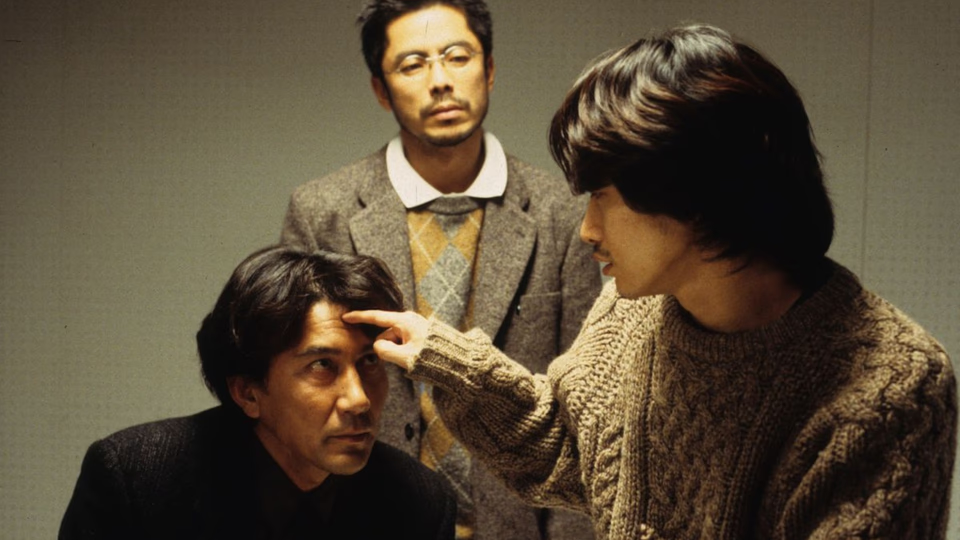Cure

Detective Takabe investigates a growing series of murders where the perpetrators carve a large “X” into their victim’s throats. Though they admit guilt, the perpetrators cannot explain their motives, just that the urge to kill felt as matter-of-fact as turning on the lights in a dark room. The trail leads Takabe to a mysterious young man named Mamiya who claims amnesia and displays an inability to form fresh memories, but harbors a dark secret. Spoilers follow.
Mamiya’s secret is that he’s a master of mesmerism, planting hypnotic suggestions to kill in his victims. He uses things like a lighter’s flame or running water to lull his victims into a hypnotic state.
Writer-director Kiyoshi Kurosawa weaves these triggers into the film’s presentation, planting pendulums, railway signals, sirens, flickering lights, and flowing water into shots, sometimes as the focus, but often as subliminal background elements. The soundtrack hums with the perpetual white noise of dryers, clanging metal, and industrial drone.
Takabe seems immune to Mamiya’s powers, fascinating Mamiya. This leads to an elliptical plot where Takabe pursues Mamiya to destroy him, but ends up becoming him.
Maybe.
Kurosawa’s original plot synopsis ended with Takabe on the beach displaying signs of memory loss similar to Mamiya. This would have taken the film full circle, but somewhere in the development process Kurosawa embraced the unreliable narrator.
By the time Takabe sets out in pursuit of the escaped Mamiya, we’re unsure if what we’re watching is real or imagined. One could make the case we’re watching an illusion meant to distract Takabe while he commits atrocious crimes. Consider how, in a 2022 interview, Kurosawa, referring to the ending, says Takabe may be a criminal1.
Like the best of David Lynch’s films, it invites rewatches to uncover its mysteries. Like the worst of David Lynch’s films, it has no definitive solution to be found.
As a quasi-remake of God Told Me To, the film improves on the original by focusing on the police procedural elements exploring the horror inherit in otherwise sane people committing unexplained acts of hideous violence.
But like God Told Me To, Cure struggles with the payoff. Positing Mamiya as “a missionary sent to propagate the ceremony” proves full of possibility, but Kurosawa’s decision to tie this to Franz Mesmer disappoints. Mesmer and his animal magnetism theories don’t inspire fear or even curiosity.
But more beyond the Mesmer connection, I struggled with Mamiya’s motives. If he’s a missionary, why the random killings? If he’s out to kill, why be so sloppy about it? Why the amnesia angle?
Here’s my take. The mesmeric cult sought to relieve people of their mental burdens by freeing them to act on their darkest desire—murder. In removing the associated guilt, it allowed the hypnotized subject to move past that emotional blocker. It doesn’t plant the urge so much as remove the inhibitions and associated remorse.
This dovetails with Takabe’s arc, where he’s torn between loving his ill wife, and resenting the burden her care imposes. Mamiya can’t “cure” Takabe because of these dual identities. Yet, for Takabe, the urge to purge both identities and be “empty” like Mamiya proves irresistible.
Thus, I read the ending as Takabe having killed his wife and unified his self. This brings him his much sought-after tranquility, as evidenced by his well-groomed appearance, relaxed demeanor, and empty plate. As part of his “cure” he’s become the new missionary, out to help others, starting with his waitress, who we see grasp a cleaver and stalk across the restaurant before the film cuts to credits.
This almost fits. Except some of Mamiya’s victims display intense guilt and remorse—consider the schoolteacher who kills his wife and the businessman who kills the prostitute. Is the message that Mamiya’s “cure” isn’t for everyone? Perhaps, but that weakens the film’s nihilistic premise. Further, there’s the matter of Takabe’s friend, the psychology professor. What was his “cure”? There’s an angle that Takabe might have killed him, but it doesn’t fit.
I’m not saying I need everything spelled out. Consider The Endless. It leaves a lot unexplained, but you have a sense that if you asked the directors about this or that bit, they’d have a concrete answer.
I’m not so sure with Cure. Kurosawa seems more interested in atmosphere and tone. To this end, it’s reminiscent of David Lynch’s more frustrating entries. Close to greatness but lacking that tangible narrative thread.
I’m surprised this flew under my radar for so long. The nihilistic plot and trap movie overtones land it right in my wheelhouse. It didn’t work for me, but I appreciate the craftsmanship at work and hope a future viewing reveals more depth.
Notes
-
No Boundaries, Criterion Channel, 2022. ↩︎